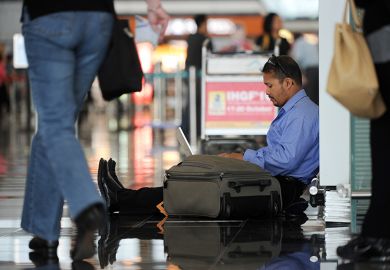Almost half of Australians think the country has too many overseas students, and people with this view also tend to have broader anti-immigration opinions, a study suggests.
Forty-six per cent of Australian adults believe universities should reduce the foreign share of university enrolments, with another 53 per cent saying the mix is “about right” and should not be changed.
The results come from the latest ANUpoll, an online and telephone survey of more than 2,000 adults undertaken by the Social Research Centre at the Australian National University. Just 1 per cent of respondents said the international proportion of students should be increased.
Current students proved easily the most supportive of foreigners’ presence on campus. Only about one-quarter said the share of international students should be reduced, compared with 44 per cent of former students and 51 per cent of those who had never attended university.
“This finding gives some support for the view that exposure to foreign students brings a more positive attitude,” said lead researcher Nicholas Biddle. “Domestic students who interact with foreign students on a daily basis are actually quite supportive.”
The results reflect concerns about the internationalisation of higher education in Australia. Critics claim universities’ appetite for tuition income has fostered over-recruitment of foreign students’ whose inadequate English language skills and unwillingness to question their lecturers detract from the educational experience of their domestic peers.
At a broader level, international students – who constitute over 2 per cent of the Australian population – are blamed for exacerbating congestion and raising house prices.
International education supporters say foreign students enrich not only university coffers but also the experience of Australians, who benefit from their culture and diverse views. Economically, Australia benefits from foreign students’ spending and labour, with about one in six remaining in the country and filling skills gaps.
In a foreword to the survey report, ANU vice-chancellor Brian Schmidt acknowledges that most Australian universities “grapple” with questions over the presence of international students.
“Here at ANU, we have decided that the right number of students for us – both international and domestic, undergraduate and postgraduate – is about 20,000. We want to ensure…students are not lost in a crowd but are part of a learning community of outstanding students from diverse backgrounds.”
The survey found that people who wanted to see international student numbers reduced tended to regard universities mainly as career preparation institutions. Supporters of the status quo were more likely to highlight universities’ roles in airing controversial ideas, promoting open science and evaluating government policies.
The researchers also cross-matched the findings with answers to questions about migration and population growth, posed in another ANUpoll late last year. Among people who responded to both surveys, those who agreed with the current student mix proved almost twice as supportive of overall population growth as those who wanted international student numbers lowered.
But the latter group proved almost twice as likely as the former to oppose migration on the grounds that “we have too much cultural diversity already”. The report cautions against reading too much into these differences and “making assumptions about the attitudes that underlie them”.
“However, the linked data…gives some support for the view that resistance to foreign students is driven in part by fears of increases in cultural diversity.”
Register to continue
Why register?
- Registration is free and only takes a moment
- Once registered, you can read 3 articles a month
- Sign up for our newsletter
Subscribe
Or subscribe for unlimited access to:
- Unlimited access to news, views, insights & reviews
- Digital editions
- Digital access to THE’s university and college rankings analysis
Already registered or a current subscriber? Login










